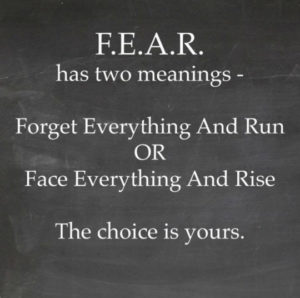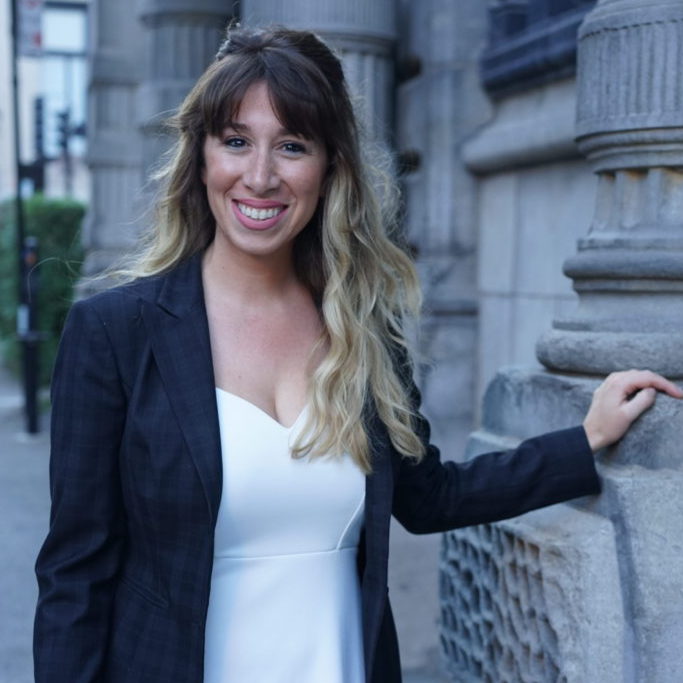Throughout my life, people have always told me (with the exception of a Balinese spiritual healer) how lucky I was to be so confident.
But the truth is, any real confidence I possess has merely been gained through repeated exposure to things that scare me and a positive mindset – and I’ve still got a long way to go.
Here’s what I’ve learned about confidence, so far.
Confidence is gained through the repeated and often terrifying exposure to what scares us the most.
When I first started acting, I was absolutely terrified of auditions. I had never been to professional auditions before, so I had no idea what to expect. When we have no idea what to expect in a high-stakes situation, we are likelier to fall prey to our ego.
I don’t know about your ego, but my ego happens to be a biatch. She’s the Katy Perry to my Taylor Swift. She’s the frenemy I try to avoid but just happens to hang in the same social circle as my BFFs, Super-Ego and Id.
“You’re not a real actor, Steph,” she taunts.
“Everyone will find out that you are a fraud.”
“You can’t memorize lines for sh*t, you’ll forget them all and embarrass yourself.”
“Everyone is gonna see your nervous AF and you’ll never be asked to audition again.”
And the worst of all:
“You’ll accept that you’ve been wrong your whole life. You DON’T have any talent, and you’ll never be an actor.”
She wasn’t entirely wrong. My first on-camera audition was a lengthy monologue for a commercial. I forgot my lines halfway through the take. I cried all night and thought I might die from the humiliation.
But I kept auditioning anyway.
Soon, I started forgetting my lines a little less. My auditions were getting a little better. I was a little less nervous. I hadn’t actually died from an audition yet. Nobody told me to quit acting and stop being an insult to the entire acting community.
Before long, I started getting parts. I became a little more confident. But I guess I’m not the only one with this story, because –
Imposter syndrome is a real thing.
Renee Zellweger, Meryl Streep, and Michelle Pfeiffer have all felt like frauds who couldn’t actually act – even after they had won Oscars.
“I still think people will find out that I’m really not very talented. I’m really not very good. It’s all been a big sham.” Michelle Pfeiffer
Mark Ruffalo is rumoured to have suffered through 500 auditions before finally getting a role. Sir Laurence Olivier would frequently throw up before his stage performances, near paralyzed with stage fright, well into the height of his career. And Barbara Streisand meditates before each live performance to calm her nerves. Regardless of their pedigrees, they’ve all had to slay their mental naysayers in order to fulfill their roles as icons of talent and confidence.
You can project confidence and still want validation.
In her 2013 Harvard commencement address, Oprah Winfrey said the following:
“The common denominator I found in every single interview is we want to be validated. We want to be understood. I’ve done over 35,000 interviews in my career. And as soon as that camera shuts off, and inevitably in their own way, everyone asks this question: ‘Was that okay?’ I heard it from President Bush, I heard it from President Obama, I’ve heard it from heroes and from housewives, I’ve heard it from victims and perpetrators of crimes. I even heard it from Beyonce in all her Beyonce-ness … They all want to know: ‘Was that okay? Did you hear me? Did you see me? Did what I said mean anything to you?’”
Not to be confused with apathy, confidence isn’t about not caring what other people think; on the contrary, it takes an enormous amount of vulnerability to generously share our truth. The most confident among us seek validation to confirm that the effort we put in to show up with all we have had a purpose. Then, they go back to the drawing table, never completely satisfied with their work; they’re confident enough to believe that their potential is infinite.
We ascribe confidence to people we choose to believe are more capable than us as an excuse not to do what we’re meant to do.
I’ve met several people through the years who have wished they could be actors, singers, motivational speakers, and a myriad of other professions involving a spotlight. When I ask the question, “Why don’t you give it a try?”, a common response I’ve received is: “No, no, I don’t have the confidence you have. I wouldn’t be able.”
We ascribe confidence to people we choose to believe are more capable than us as an excuse not to do what we're meant to do. Click To TweetThe thing is, though – we’re all ABLE. Sure, we might fail. We might shake in fear, and get booed off stage
But we might try again. And we might eventually succeed.
Here are some examples of some people who had no business being confident, and yet somehow succeeded:
Jerry Seinfeld, who froze upon seeing his audience and was booed off the stage his first time performing in a comedy club
Oprah Winfrey, who grew up in abject poverty, was beaten, raped and fell pregnant at 14 years old, and was eventually fired from her first job as a TV news anchor.
Walt Disney, who was fired from the Kansas City Star due to a “lack of creativity”
Meryl Streep, who was told she was too ugly to appear in King Kong while auditioning for the lead
Thomas Edison, told by one of his professors that he was “too stupid to learn anything”.
And the list goes on and on.
So now that we know a little more about confidence – what can we do to build it?
-
Build your communication skills.
A great way to develop your leadership and communication skills – and face your fear of public speaking – is to join a local Toastmasters club. Member fees are nominal, and the practical experience is priceless.
-
Use non-verbal assists.
In her Ted Talk “Your body language may shape who you are”, social psychologist Amy Cuddy reveals how research shows that striking “power poses” for a few minutes can influence how confident you feel – rather than the reverse. So next time you’ve got a big interview, audition, or important meeting, strike an akimbo pose for a few minutes to get your confidence flowing.
-
Use your real voice.
A couple of years ago, when I was still a novice actor, I learned that I wasn’t using my “real voice”. I was still using my little girl, cutesy, small voice – the voice that lives in my chest and throat. After a ton of practice (and vocal coaching), I learned how to tell the difference between my shallow voice, and the much larger voice that came out when I breathed with my diaphragm. My voice became stronger and more powerful, and I felt more confident as a result. Here is a great article on the link between diaphragmatic breathing and public speaking performance.
-
Be as prepared as you can be – and accept that you do not know everything.
As a “star” co-op student back in university, one of my biggest secrets to acing job interviews was knowing there wasn’t a question I could not answer – even if the answer is “I don’t know”. Let me explain. Sometimes, people will throw curveball questions at me. But I knew I was well prepared. I read through the website, the job description, and the blog. I’d researched the people in the interview room. I knew all there was to know about the given industry I was interviewing for (to the best of my ability, anyway). So when I did receive the occasional curveball, I didn’t panic. I would reflect on it for a moment and smile. I would say “You know, I’m not sure how to answer that. I’m not as familiar with that topic. I’m curious. Can you tell me more about it?” Or, “Thank you for that question. Let me think before I give you an answer.” I would think for a moment or two and then answer to the best of my ability. And the interview continued, and everything was fine.
-
Get comfortable with making mistakes.
I hold myself to a very high professional standard. As such, I will rarely make mistakes at work – but I know it can happen. In fact, it has. Nobody fired me, and everybody learned. I eliminate the fear of making mistakes by never pretending that I’m perfect. As an English teacher, I fully admit and tell my students that I myself learn something new about the English language every day. I do my due diligence, and my confidence in my skills grows a result.
-
Surround yourself with collaborators and eliminate naysayers.
Eliminate toxic people from your life and replace them with Collaborators – a term coined by life coach Dallas Travers to describe the people in your life who will support you, encourage you and provide you with constructive feedback.
-
See the bricks, not the wall.
Language learning can be a very difficult endeavour. When my clients get discouraged, I ask them to picture their language learning challenges as a collection of bricks, rather than an insurmountable wall. Every time they achieve a small goal – whether it’s learning ten new words, mastering a verb tense, or eliminating a pronunciation error – they remove a brick from the wall. Slowly, with every brick removed, the wall becomes dismantled, and confidence that they can reach the other side grows.
-
Engage in constant positive self-talk.
A couple of years ago, I bombed a theatre audition I had prepared WEEKS for. I bought props (a big no-no), wore a costume (an even bigger no-no) and rehearsed my scene until I was blue in the face. I auditioned in front of a panel of five elite theatre professionals, and the look on their faces said it all once I was done: collect your things and be gone from our presence as quickly as humanly possible. Through my tears, I remembered a positive affirmation I learned from one of my acting coaches, Jack Plotnick: “Rejection is God’s (or, the universe’s) protection.” I repeated it to myself many times before auditioning and getting cast in one of the roles of my dreams just a few weeks later. Confidence restored.
Your turn.
What are some of the ways you build confidence in your everyday life? Share your wisdom below.





Minseo June 24, 2018 at 1:04 pm
Hi! I wanted to contect you directly but for some reason the message refuses to go…? sorry i have to make an unrelated comment but i was wondering if you could send me an e-mail! Thank you and have a great day!